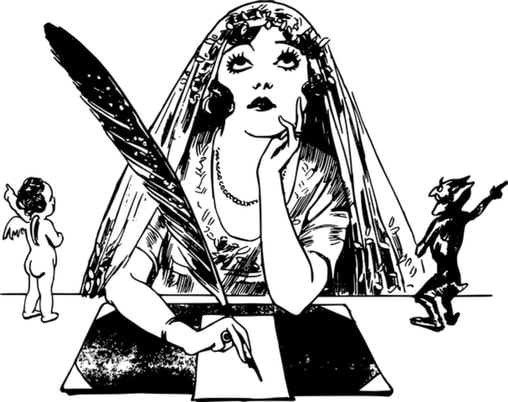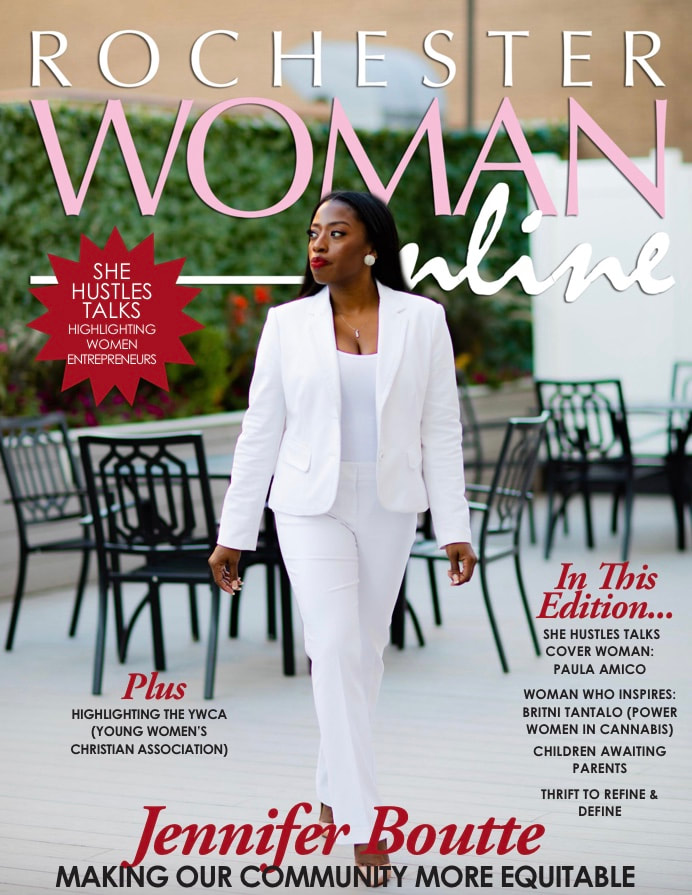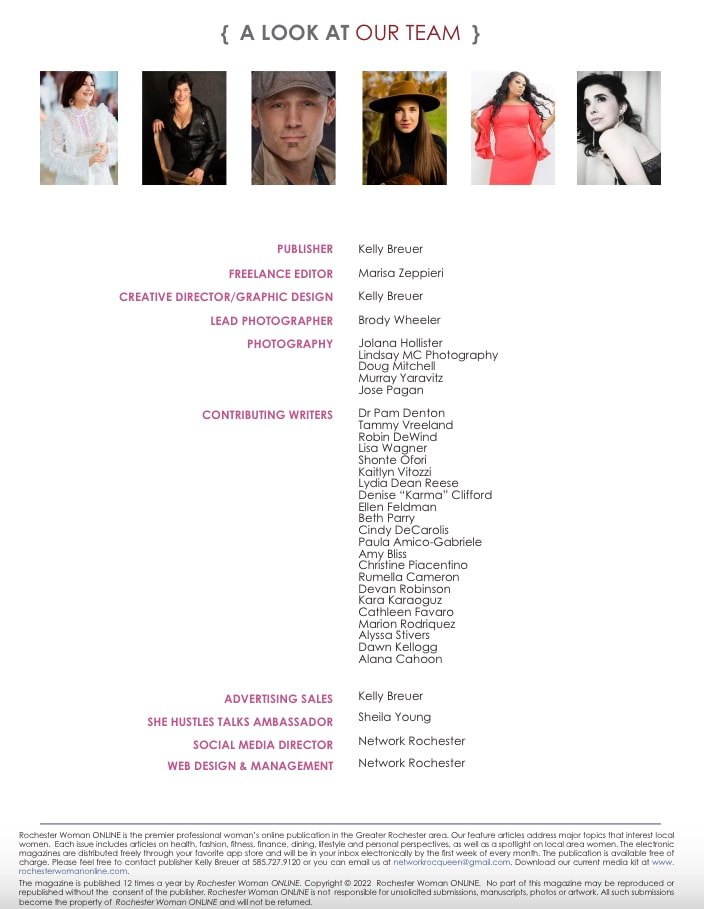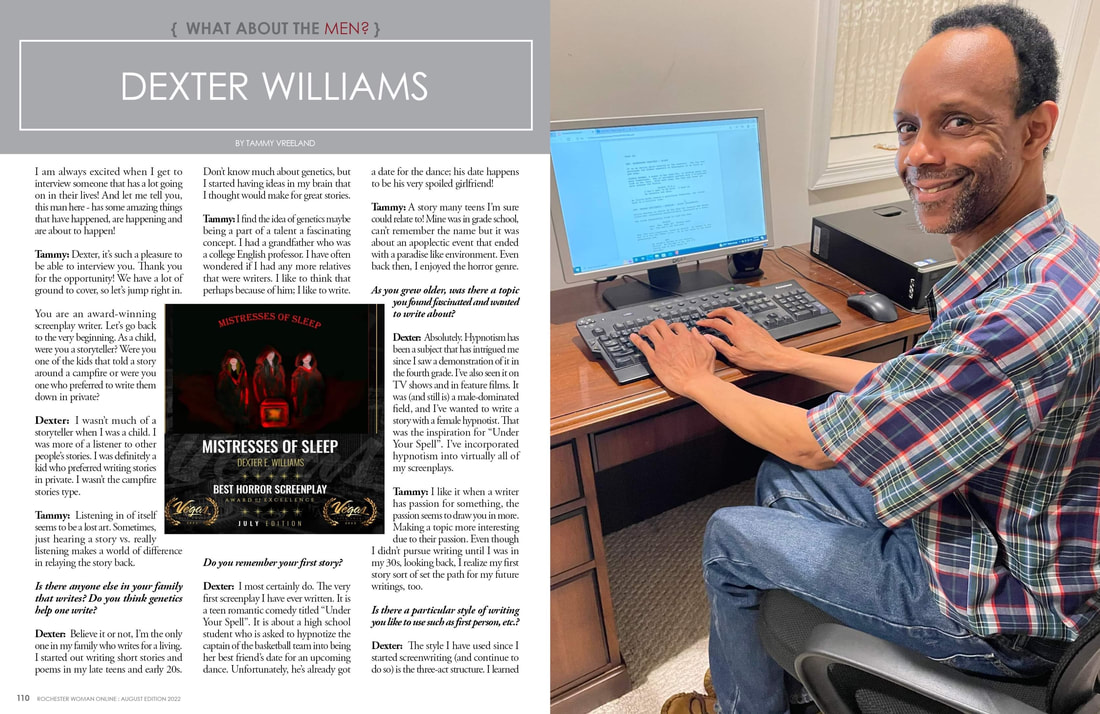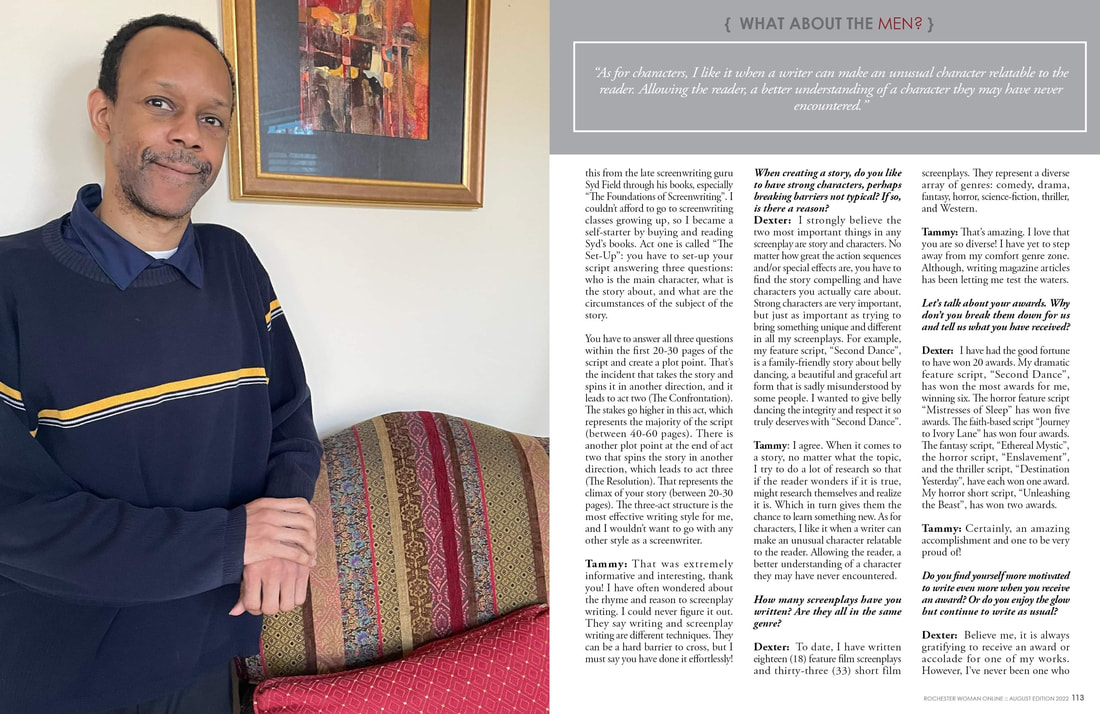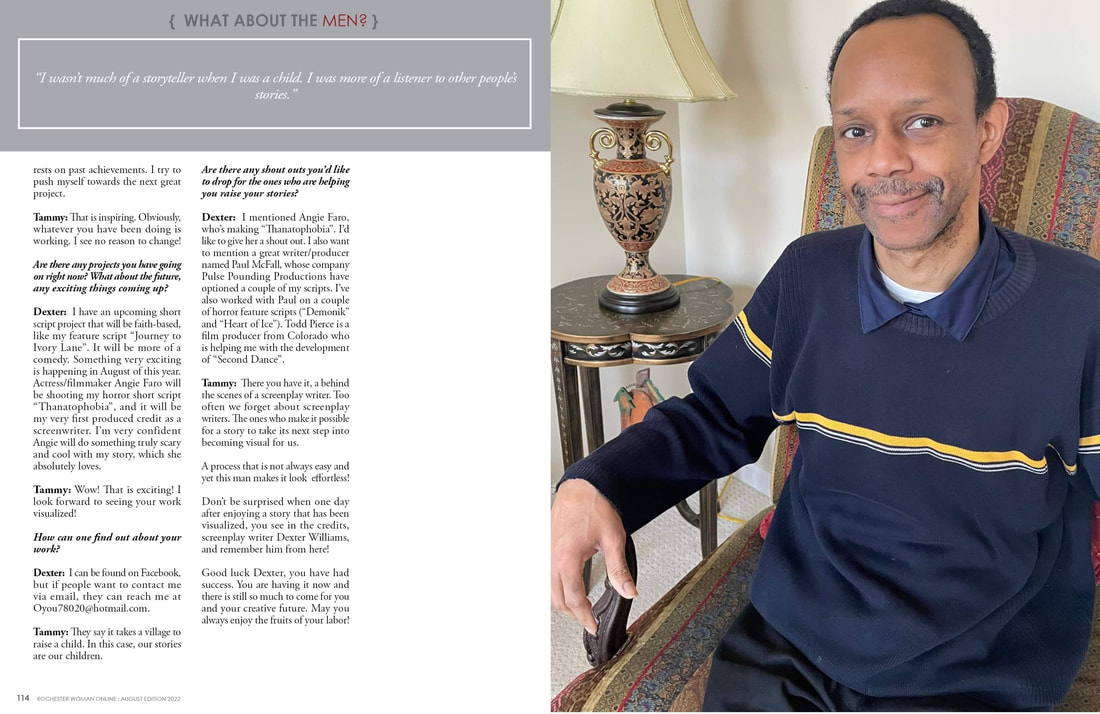Dexter Williams
My Interview with Dexter
Dexter Williams
I am always excited when I get to interview someone that has a lot going on in their lives! And let me tell you, this man here - has some amazing things that have happened, are happening and are about to happen!
Tammy: Dexter, it’s such a pleasure to be able to interview you. Thank you for the opportunity! We have a lot of ground to cover, so let’s jump right in. You are an award-winning screenplay writer. Let’s go back to the very beginning.
As a child, were you a storyteller? Were you one of the kids that told a story around a campfire or were you one who preferred to write them down in private?
Dexter: I wasn’t much of a storyteller when I was a child. I was more of a listener to other people’s stories. I was definitely a kid who preferred writing stories in private. I wasn’t the campfire stories type.
Tammy: Listening in of itself seems to be a lost art. Sometimes, just hearing a story vs. really listening makes a world of difference in relaying the story back.
Is there anyone else in your family that writes? Do you think genetics help one write?
Dexter: Believe it or not, I'm the only one in my family who writes for a living. I started out writing short stories and poems in my late teens and early 20s. Don't know much about genetics, but I started having ideas in my brain that I thought would make for great stories.
Tammy: I find the idea of genetics maybe being a part of a talent a fascinating concept. I had a grandfather who was a college English professor. I have often wondered if I had any more relatives that were writers. I like to think that perhaps because of him; I like to write.
Do you remember your first story?
Dexter: I most certainly do. The very first screenplay I have ever written. It is a teen romantic comedy titled "Under Your Spell". It is about a high school student who is asked to hypnotize the captain of the basketball team into being her best friend's date for an upcoming dance. Unfortunately, he's already got a date for the dance; his date happens to be his very spoiled girlfriend!
Tammy: A story many teens I’m sure could relate to! Mine was in grade school, can’t remember the name but it was about an apoplectic event that ended with a paradise like environment. Even back then, I enjoyed the horror genre.
As you grew older, was there a topic you found fascinated and wanted to write about?
Dexter: Absolutely. Hypnotism has been a subject that has intrigued me since I saw a demonstration of it in the fourth grade. I've also seen it on TV shows and in feature films. It was (and still is) a male-dominated field, and I've wanted to write a story with a female hypnotist. That was the inspiration for "Under Your Spell". I've incorporated hypnotism into virtually all of my screenplays.
Tammy: I like it when a writer has passion for something, the passion seems to draw you in more. Making a topic more interesting due to their passion. Even though I didn’t pursue writing until I was in my 30s, looking back, I realize my first story sort of set the path for my future writings, too.
Is there a particular style of writing you like to use such as first person, etc.?
Dexter: The style I have used since I started screenwriting (and continue to do so) is the three-act structure. I learned this from the late screenwriting guru Syd Field through his books, especially "The Foundations of Screenwriting". I couldn't afford to go to screenwriting classes growing up, so I became a self-starter by buying and reading Syd's books.
Act one is called "The Set-Up": you have to set-up your script answering three questions: who is the main character, what is the story about, and what are the circumstances of the subject of the story. You have to answer all three questions within the first 20-30 pages of the script and create a plot point. That's the incident that takes the story and spins it in another direction, and it leads to act two (The Confrontation).
The stakes go higher in this act, which represents the majority of the script (between 40-60 pages). There is another plot point at the end of act two that spins the story in another direction, which leads to act three (The Resolution). That represents the climax of your story (between 20-30 pages). The three-act structure is the most effective writing style for me, and I wouldn't want to go with any other style as a screenwriter.
Tammy: That was extremely informative and interesting, thank you! I have often wondered about the rhyme and reason to screenplay writing. I could never figure it out. They say writing and screenplay writing are different techniques. They can be a hard barrier to cross, but I must say you have done it effortlessly!
When creating a story, do you like to have strong characters, perhaps breaking barriers not typical? If so, is there a reason?
Dexter: I strongly believe the two most important things in any screenplay are story and characters. No matter how great the action sequences and/or special effects are, you have to find the story compelling and have characters you actually care about.
Strong characters are very important, but just as important as trying to bring something unique and different in all my screenplays. For example, my feature script, "Second Dance", is a family-friendly story about belly dancing, a beautiful and graceful art form that is sadly misunderstood by some people. I wanted to give belly dancing the integrity and respect it so truly deserves with "Second Dance".
Tammy: I agree. When it comes to a story, no matter what the topic, I try to do a lot of research so that if the reader wonders if it is true, might research themselves and realize it is. Which in turn gives them the chance to learn something new. As for characters, I like it when a writer can make an unusual character relatable to the reader. Allowing the reader, a better understanding of a character they may have never encountered.
How many screenplays have you written? Are they all in the same genre?
Dexter: To date, I have written eighteen (18) feature film screenplays and thirty-three (33) short film screenplays. They represent a diverse array of genres: comedy, drama, fantasy, horror, science-fiction, thriller, and Western.
Tammy: That’s amazing. I love that you are so diverse! I have yet to step away from my comfort genre zone. Although, writing magazine articles has been letting me test the waters.
Let’s talk about your awards. Why don’t you break them down for us and tell us what you have received?
Dexter: I have had the good fortune to have won 20 awards. My dramatic feature script, "Second Dance”, has won the most awards for me, winning six. The horror feature script "Mistresses of Sleep" has won five awards. The faith-based script "Journey to Ivory Lane" has won four awards. The fantasy script, "Ethereal Mystic", the horror script, "Enslavement", and the thriller script, "Destination Yesterday", have each won one award. My horror short script, "Unleashing the Beast", has won two awards.
Tammy: Certainly, an amazing accomplishment and one to be very proud of!
Do you find yourself more motivated to write even more when you receive an award? Or do you enjoy the glow but continue to write as usual?
Dexter: Believe me, it is always gratifying to receive an award or accolade for one of my works. However, I've never been one who rests on past achievements. I try to push myself towards the next great project.
Tammy: That is inspiring. Obviously, whatever you have been doing is working. I see no reason to change!
Are there any projects you have going on right now? What about the future, any exciting things coming up?
Dexter: I have an upcoming short script project that will be faith-based, like my feature script "Journey to Ivory Lane". It will be more of a comedy. Something very exciting is happening in August of this year. Actress/filmmaker Angie Faro will be shooting my horror short script "Thanatophobia", and it will be my very first produced credit as a screenwriter. I'm very confident Angie will do something truly scary and cool with my story, which she absolutely loves.
Tammy: Wow! That is exciting! I look forward to seeing your work visualized!
How can one find out about your work?
Dexter: I can be found on Facebook, but if people want to contact me via email, they can reach me at [email protected].
Tammy: They say it takes a village to raise a child. In this case, our stories are our children.
Are there any shout outs you’d like to drop for the ones who are helping you raise your stories?
Dexter: I mentioned Angie Faro, who's making "Thanatophobia". I'd like to give her a shout out. I also want to mention a great writer/producer named Paul McFall, whose company Pulse Pounding Productions have optioned a couple of my scripts. I've also worked with Paul on a couple of horror feature scripts ("Demonik" and "Heart of Ice"). Todd Pierce is a film producer from Colorado who is helping me with the development of "Second Dance".
Tammy: There you have it, a behind the scenes of a screenplay writer. Too often we forget about screenplay writers. The ones who make it possible for a story to take its next step into becoming visual for us.
A process that is not always easy and yet this man makes it look effortless! Don’t be surprised when one day after enjoying a story that has been visualized, you see in the credits, screenplay writer Dexter Williams, and remember him from here!
Good luck Dexter, you have had success. You are having it now and there is still so much to come for you and your creative future. May you always enjoy the fruits of your labor!
Tammy: Dexter, it’s such a pleasure to be able to interview you. Thank you for the opportunity! We have a lot of ground to cover, so let’s jump right in. You are an award-winning screenplay writer. Let’s go back to the very beginning.
As a child, were you a storyteller? Were you one of the kids that told a story around a campfire or were you one who preferred to write them down in private?
Dexter: I wasn’t much of a storyteller when I was a child. I was more of a listener to other people’s stories. I was definitely a kid who preferred writing stories in private. I wasn’t the campfire stories type.
Tammy: Listening in of itself seems to be a lost art. Sometimes, just hearing a story vs. really listening makes a world of difference in relaying the story back.
Is there anyone else in your family that writes? Do you think genetics help one write?
Dexter: Believe it or not, I'm the only one in my family who writes for a living. I started out writing short stories and poems in my late teens and early 20s. Don't know much about genetics, but I started having ideas in my brain that I thought would make for great stories.
Tammy: I find the idea of genetics maybe being a part of a talent a fascinating concept. I had a grandfather who was a college English professor. I have often wondered if I had any more relatives that were writers. I like to think that perhaps because of him; I like to write.
Do you remember your first story?
Dexter: I most certainly do. The very first screenplay I have ever written. It is a teen romantic comedy titled "Under Your Spell". It is about a high school student who is asked to hypnotize the captain of the basketball team into being her best friend's date for an upcoming dance. Unfortunately, he's already got a date for the dance; his date happens to be his very spoiled girlfriend!
Tammy: A story many teens I’m sure could relate to! Mine was in grade school, can’t remember the name but it was about an apoplectic event that ended with a paradise like environment. Even back then, I enjoyed the horror genre.
As you grew older, was there a topic you found fascinated and wanted to write about?
Dexter: Absolutely. Hypnotism has been a subject that has intrigued me since I saw a demonstration of it in the fourth grade. I've also seen it on TV shows and in feature films. It was (and still is) a male-dominated field, and I've wanted to write a story with a female hypnotist. That was the inspiration for "Under Your Spell". I've incorporated hypnotism into virtually all of my screenplays.
Tammy: I like it when a writer has passion for something, the passion seems to draw you in more. Making a topic more interesting due to their passion. Even though I didn’t pursue writing until I was in my 30s, looking back, I realize my first story sort of set the path for my future writings, too.
Is there a particular style of writing you like to use such as first person, etc.?
Dexter: The style I have used since I started screenwriting (and continue to do so) is the three-act structure. I learned this from the late screenwriting guru Syd Field through his books, especially "The Foundations of Screenwriting". I couldn't afford to go to screenwriting classes growing up, so I became a self-starter by buying and reading Syd's books.
Act one is called "The Set-Up": you have to set-up your script answering three questions: who is the main character, what is the story about, and what are the circumstances of the subject of the story. You have to answer all three questions within the first 20-30 pages of the script and create a plot point. That's the incident that takes the story and spins it in another direction, and it leads to act two (The Confrontation).
The stakes go higher in this act, which represents the majority of the script (between 40-60 pages). There is another plot point at the end of act two that spins the story in another direction, which leads to act three (The Resolution). That represents the climax of your story (between 20-30 pages). The three-act structure is the most effective writing style for me, and I wouldn't want to go with any other style as a screenwriter.
Tammy: That was extremely informative and interesting, thank you! I have often wondered about the rhyme and reason to screenplay writing. I could never figure it out. They say writing and screenplay writing are different techniques. They can be a hard barrier to cross, but I must say you have done it effortlessly!
When creating a story, do you like to have strong characters, perhaps breaking barriers not typical? If so, is there a reason?
Dexter: I strongly believe the two most important things in any screenplay are story and characters. No matter how great the action sequences and/or special effects are, you have to find the story compelling and have characters you actually care about.
Strong characters are very important, but just as important as trying to bring something unique and different in all my screenplays. For example, my feature script, "Second Dance", is a family-friendly story about belly dancing, a beautiful and graceful art form that is sadly misunderstood by some people. I wanted to give belly dancing the integrity and respect it so truly deserves with "Second Dance".
Tammy: I agree. When it comes to a story, no matter what the topic, I try to do a lot of research so that if the reader wonders if it is true, might research themselves and realize it is. Which in turn gives them the chance to learn something new. As for characters, I like it when a writer can make an unusual character relatable to the reader. Allowing the reader, a better understanding of a character they may have never encountered.
How many screenplays have you written? Are they all in the same genre?
Dexter: To date, I have written eighteen (18) feature film screenplays and thirty-three (33) short film screenplays. They represent a diverse array of genres: comedy, drama, fantasy, horror, science-fiction, thriller, and Western.
Tammy: That’s amazing. I love that you are so diverse! I have yet to step away from my comfort genre zone. Although, writing magazine articles has been letting me test the waters.
Let’s talk about your awards. Why don’t you break them down for us and tell us what you have received?
Dexter: I have had the good fortune to have won 20 awards. My dramatic feature script, "Second Dance”, has won the most awards for me, winning six. The horror feature script "Mistresses of Sleep" has won five awards. The faith-based script "Journey to Ivory Lane" has won four awards. The fantasy script, "Ethereal Mystic", the horror script, "Enslavement", and the thriller script, "Destination Yesterday", have each won one award. My horror short script, "Unleashing the Beast", has won two awards.
Tammy: Certainly, an amazing accomplishment and one to be very proud of!
Do you find yourself more motivated to write even more when you receive an award? Or do you enjoy the glow but continue to write as usual?
Dexter: Believe me, it is always gratifying to receive an award or accolade for one of my works. However, I've never been one who rests on past achievements. I try to push myself towards the next great project.
Tammy: That is inspiring. Obviously, whatever you have been doing is working. I see no reason to change!
Are there any projects you have going on right now? What about the future, any exciting things coming up?
Dexter: I have an upcoming short script project that will be faith-based, like my feature script "Journey to Ivory Lane". It will be more of a comedy. Something very exciting is happening in August of this year. Actress/filmmaker Angie Faro will be shooting my horror short script "Thanatophobia", and it will be my very first produced credit as a screenwriter. I'm very confident Angie will do something truly scary and cool with my story, which she absolutely loves.
Tammy: Wow! That is exciting! I look forward to seeing your work visualized!
How can one find out about your work?
Dexter: I can be found on Facebook, but if people want to contact me via email, they can reach me at [email protected].
Tammy: They say it takes a village to raise a child. In this case, our stories are our children.
Are there any shout outs you’d like to drop for the ones who are helping you raise your stories?
Dexter: I mentioned Angie Faro, who's making "Thanatophobia". I'd like to give her a shout out. I also want to mention a great writer/producer named Paul McFall, whose company Pulse Pounding Productions have optioned a couple of my scripts. I've also worked with Paul on a couple of horror feature scripts ("Demonik" and "Heart of Ice"). Todd Pierce is a film producer from Colorado who is helping me with the development of "Second Dance".
Tammy: There you have it, a behind the scenes of a screenplay writer. Too often we forget about screenplay writers. The ones who make it possible for a story to take its next step into becoming visual for us.
A process that is not always easy and yet this man makes it look effortless! Don’t be surprised when one day after enjoying a story that has been visualized, you see in the credits, screenplay writer Dexter Williams, and remember him from here!
Good luck Dexter, you have had success. You are having it now and there is still so much to come for you and your creative future. May you always enjoy the fruits of your labor!

